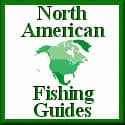Bass on Hook is Supported by our readers. As an Amazon Associate We earn commissions from qualifying purchases. For more informtion read our Amazon Affiliate Disclosure and Affiliate Disclosure Policies.
A Bass's Sense Of Smell
By Leo Watson
Not to very long ago few anglers knew that the black bass even had a nose, let alone used it.
Only recently has any attention been given to the bass's sense of smell.
How good is it?
Research biologists are still testing but the fishing industry has introduced a host of effective bass scents.
Bass fishermen just like us buy loads of them.
A Bass's Sense of Smell is a Multi Million Dollar Business
It has been reported that annual scent sales are in the neighborhood of $40-$50 million.
More than 50 manufacturers have at one time or another been marketing scent products.
Scientific Bass Products, Berkley, Normark and other manufacturers have jumped into the very lucrative market.
Each has numerous testimonials from biologists, professional anglers and weekend anglers who swear by their favorite scent.
This anglers choice of scent is Kick'n Bass.
It is in this pro's opinion the best on the market bar none!
You are invited to read this authors testimonial for Kick'n Bass at Kicknbass.
It is testimonial #99 in the professional anglers section.
The Science Behind the Bass's Sense of Smell
While a great deal of research has been conducted on the olfactory systems (sense of smell) of salmon and catfish, comparatively little has been done on bass until recently.
We do know that a bass's sense of smell is not as keen as that of a salmon or catfish, but it is much better than previously thought.
It has been noted that bass discriminate scent much better than even the best bird dog.
Any discussion of the bass's sense of smell should consider how they use it, i.e., for foraging or protection and when.
Bass use their full range of senses especially when visibility is limited.
Smell becomes increasingly important in low light or muddy water situations.
The bass's preyfish are composed of amino acids, the building blocks of all protein and flesh.
Each preyfish contains differing proportions of amino acids.
The injury of a preyfish and release of amino acids into the water elicits a searching behavior from the bass.
This is one reason why scent products with amino acids are attractive to bass.
Tests by bass researcher Dr. Loren Hill show that bass can detect a preyfish odor source at a distance of 25 feet.
Only the bass's sense of hearing (which is my next article) is capable of greater range under normal water clarity conditions.
Dr. Hill also points out that the bass exhibit a snakelike swimming action when honing in on an odor source.
A bass has a pair of nostrils or nares, on each side of its head between the eyes and upper lip.
Each nostril has two openings separated by a bridge of skin.
Water does circulate continuously through these short passages where microscopic, hair like cilia detect odors.
The water passes through the nostrils without entering the throat.
As a bass swims about, water movement is enhanced and the nostrils are constantly in use.
A membrane tissue, called the olfactory epithelium, consists of complex folds that line the nostrils.
This membrane greatly increases the total surface area and the bass's receptive scenting powers.
Within the epithelium odor molecules activate millions of olfactory receptor nerve cells, these send a message to the olfactory centers of the bass's brain where the odor is interpreted.
As a bass ages and grows larger, the number of olfactory folds increases.
It has been found that young 4 to 6 inch largemouth bass have 5 or 6 folds.
A 12 inch bass may have 10 folds while one 20 inches in length may have as many as 20 folds.
It has also been found that the diameter of the olfactory organ itself grows with age.
Most scientists conclude that older bass have a better developed sense of smell.
In Summary
In concluding this article anglers must realize that to catch bass you must appeal to their senses.
Their primary sense is sight however, if they can't rely on their sight we must be prepared to appeal to their other senses.
The successful angler will use scents to his advantage to appeal to their sense of smell as well as to cover up human odor.
One tactic I do use with the scent to mask my human odor is to apply scent to my fingers and rub it directly to the first 4 or 5 feet of my fishing line.
This is especially effective when flipping or pitching.
This is the second in an ongoing series of articles to help you better understand how the bass's senses work.
The greater your knowledge of a bass's senses become, the better your chances are of boating more fish.
Keep checking back on this web site for my next article the "Sense Of Hearing".
Remember always take a kid fishing. You are helping to ensure the great sport of bass fishing.
Good luck,
Leo Watson
Pro Staff
Look for other articles written by Leo Watson in Leo's Pro Staff Angler Profile










